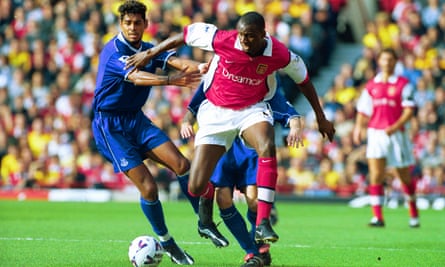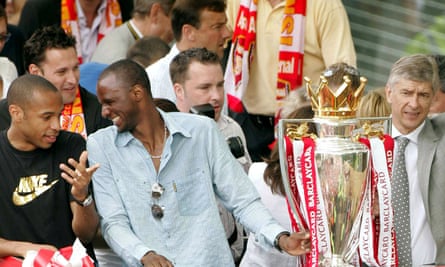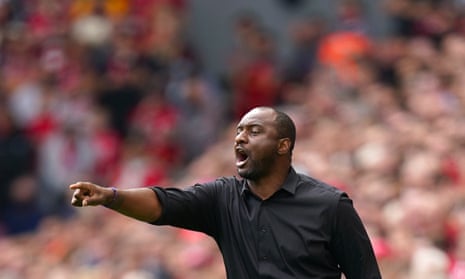In the summer of 2009, Arsène Wenger found himself wrestling with temptation. Arsenal had not acquired anyone who could patrol a midfield quite like Patrick Vieira in the four years since his departure, and they were still struggling for leaders in a dressing room high on talent but short on direction. Who better to solve at least one of those problems, perhaps, than the former captain himself? Vieira was by then a declining force at Internazionale and angling for a return to London. “There is a football decision and there is the psychological impact of a player of that stature coming in,” Wenger mused. “We don’t rule it out and we don’t say we will do it.”
Ultimately Wenger did not succumb, admitting later that it had been a “real tough call”, and Vieira stayed at Inter for another year. Arsenal got their shot of nostalgia through Sol Campbell’s brief return a few months later, but spent the next decade grasping for a healthier relationship with the past.
There will be nothing ill-fitting about the reception Vieira receives when he leads Crystal Palace to the Emirates Stadium. Legends should be celebrated and, in those few minutes between the sides emerging and Mike Dean blowing the first whistle, due homage will be paid to the best midfielder most of those fans will have seen. For the hour and a half after that, though, Mikel Arteta’s players will be expected to offer the latest glimmer of hope that they can write their own history.
When Vieira, Campbell, Dennis Bergkamp and Thierry Henry are your benchmarks it is hard to move on, and Arsenal have never quite managed to. “It is because normally they become heroes when they are successful, when you win football matches and trophies,” Arteta said, offering something of a truism. “To do that you don’t just need an individual, you need a squad and a really good generation, in this context probably the best ever generation in Premier League history to become champions of this league.”
Henry and Bergkamp are immortalised through statues outside Arsenal’s home. That honour is yet to be bestowed upon Vieira, perhaps because his contribution is not quite as catchily measured in breathtaking goals and gossamer assists, but there is a curious paradox. During the interminable discussions around what Arsenal have lacked since the Invincibles’ day, cravings for a “new Vieira” have reliably come out on top. Outstanding scorers and creators, even if not quite in their predecessors’ bracket, have still found their way to north London during the barren years; nobody, though, has come close to the extraordinary all‑round influence Vieira could wield in the engine room.

There have been near misses, or at least attempts at a succession plan that would have eased the post-Vieira transition and perhaps have given wispier talents a more solid platform. In 2004, a year before he left for Juventus, Arsenal expected Vieira to join Real Madrid and had lined up Michael Carrick to take his place. A deal to sign him from West Ham was all but done until Vieira changed his mind, deciding to continue at Highbury. Wenger was hardly distraught: Cesc Fàbregas was coming up on the rails and he was convinced the teenager could ultimately fill Vieira’s shoes.
Fàbregas’s quality was never in doubt, but nor was the fact Arsenal largely felt rudderless until his departure in 2011. It is well documented that, three years before the increasingly disillusioned Spaniard left for Barcelona, Wenger could have partnered him with Xabi Alonso. Senior figures at Arsenal pushed for the move to take place, some noting they had never seen a footballer so desperate to join them. In the end Wenger demurred, unwilling to splash out when Denílson, Alex Song and Abou Diaby were staking a claim. It was a quixotic project but Alonso would surely have offered the presence, balance and knowhow that were sorely lacking.
Vieira summed up the persistent issue many years later, speaking in 2016. “Now when I watch Arsenal, yes they play good football but I just have a feeling they are missing something: the physical presence, the personality,” he said.
Diaby had initially been viewed by Arsenal’s hierarchy as a recruit who could, like Vieira, do it all. The horrendous injury he sustained at Sunderland in May 2006, unbalancing his body to the extent that he never fulfilled his breathtaking potential, wrecked that vision. Perhaps the Vieira comparison would, in any case, have been a highly specific and unrealistic burden. It has been bestowed upon numerous players, often unrealistically or inaccurately; Thomas Partey is the latest figure to be similarly hyped and Arteta had a point when he said players must find a way to tread their own path.

“When you get that comparison you need to accept straight away that if you don’t win three or four Premier League titles you will always be worse than the previous one, because he has already done it and you have just started,” he said. “Then just focus on what you are as a player, what you are asked by your manager to do: be yourself and don’t try to be anyone else.”
It is easier said than done: Arsenal have not won a Premier League title since Vieira’s penultimate campaign so the task in hand, if they are to cast the shadow aside entirely, is both obvious and severe. If their former linchpin oversees an away win for Palace, who took five points from their last three matches at the Emirates under Roy Hodgson, it will puncture the semblance of momentum Arteta and Arsenal have built over the past month and emphasise the struggle they face in scrambling clear of mid-table. A resounding home victory, though, might raise hopes that the strut and steel of old are not irretrievable.
That outcome could also help disabuse Arteta’s doubters of any notion that, when the club selected an admired midfield general to take charge, it might as well have picked the man in the opposing technical area. Perhaps the stars will align in future so that Vieira, having thrived at Palace, is placed to take the reins at an iteration of Arsenal that feels as comfortable looking forward as it does gazing back into history. That day is some way off but, for a time on Monday night, any soul-searching may be put on hold. The acclaim for Vieira will be deserved and pure.
